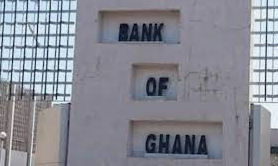Ghana intends to convert loans to the Bank of Ghana that are believed to be worth 40 billion cedis ($3.3 billion) into bonds, making the Central Bank the sole owner of domestic government assets and subjecting it to the ongoing debt restructuring process.
The bonds, which will also pay the interest owed to the Bank of Ghana, would be issued by the finance ministry, according to sources with knowledge of the situation.
There are no specifics regarding a schedule for the securitization, but the government wants to finish restructuring its public debt this quarter in order to receive board approval from the International Monetary Fund (IMF) by the end of March.
The securitized central bank loan will be added to the list of domestic debt under restructuring, according to the sources. The new bonds would bring the central bank into Ghana’s ongoing debt restructuring process, under which the government is asking investors to swap out 137.3 billion cedis ($11.2 billion) worth of local government securities into new notes with less attractive terms. The voluntary exchange has a February 7 deadline.
The restructuring is a key condition for Ghana to qualify for a desperately needed $3 billion bailout from the IMF. However, the IMF has also urged Ghana to stop borrowing from the central bank in order to secure the bailout, as previously reported.
Ghana’s government debt reached 575.7 billion cedis ($47 billion) at the end of November 2022, while its public debt stood at an estimated 105% of its gross domestic product, a figure the country hopes to reduce to 55% by 2028.
Besides restructuring its local bonds, Ghana is also in talks to restructure its bilateral and external debt.
A spokesperson for the central bank declined to comment, while a spokesperson for the finance ministry did not immediately respond to requests for comment.
According to Ghanaian regulations, Section 30 of the Bank of Ghana Act permits the central bank to lend to the government. However, if repayment is “unduly delayed,” the Bank may transfer the debt to the public through the sale of treasury bills. Securitizing the loans would head off the central bank issuing treasury bills to recoup its money.
Ghana has been shut out of international markets after suspending interest payments on $13 billion of Eurobonds.
The country is facing fiscal and economic challenges, and the securitization of central bank loans could help it avoid further difficulties as it seeks to secure a much-needed bailout from the IMF.















































